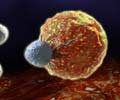
Leukemic cutaneous T-cell lymphoma is a leukemia arising from T-cells, a type of white blood cell. This cancer can involve the skin and other organs, and patients often die within three years.
Campath was previously believed to kill all lymphocytes (T-cells and B-cells) in the body and render patients susceptible to infections. However, Clark and Kupper found that Campath only kills T-cells that enter the bloodstream, but it spares a newly discovered population of T-cells that live long-term in the tissues.
"We noticed that our patients were not getting infections, and we looked in the skin. We saw healthy T-cells remaining there despite the fact that there were no T-cells in the blood," said Clark. "We used to believe that most T-cells responsible for protecting against infection were in the bloodstream. But we now realize that highly protective T-cells also inhabit tissues such as the skin, lungs and gastrointestinal tract. It is these tissue resident T-cells that are critical in protecting us from infection on a day-to-day basis."
By showing that Campath kills circulating T-cells, including the cancerous T-cells, but spares tissue resident T-cells, Clark and Kupper have shown that Campath effectively treats L-CTCL while sparing normal immunity. Their findings are also the first demonstration in human beings that tissue resident T-cells provide frontline immune protection of the skin.
"We're very grateful to our patients for entrusting us with their care and for teaching us important lessons about the immune system." said Clark.
Advertisement
Advertisement












